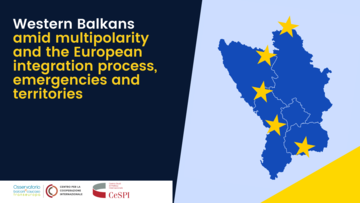Western Balkans amid multipolarity and the European integration process, emergencies and territories
The European Union’s enlargement path to the Western Balkans provides a frame and background to the bilateral and multilateral relations that take place between Member States and acceding countries. The emergencies that have characterised the last few months, from the pandemic to the rekindling of migratory flows through the so-called "Balkan Route", raise questions of great political importance, which may also affect the integration process into the European Union for the countries of the region.
The first two sections of this document focus on the challenges arising from these emergencies, highlighting the critical issues, but also the potential for a growing integration of the Western Balkans. Indeed, the importance of sharing on a transnational scale and the urgency to grasp the potential in place constitute the grounds for the third section, which focuses on the opportunities provided by the EUSAIR macro-regional strategy.
With its participation on an equal footing of EU Member States and acceding countries, and with its inclusive approach towards the various territorial stakeholders, the strategy could offer a specific contribution to enlargement and more generally to the shared management and enhancement of the Adriatic-Ionian region. Finally, a greater involvement of national parliaments in the strategy could make a crucial contribution to this aim.
Position paper prepared for the Interparliamentary Conference Western Balkans: amid multipolarity and the European integration process Organized by the Foreign Affairs Committee House of Deputies April 26, 2021
By: OBCT and CeSPI
Language: English


